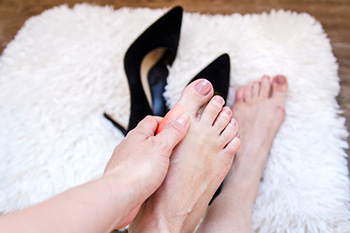
Bunions, also known as hallux valgus, are more prevalent in women, especially as they age. This deformity develops when the big toe angles inward toward the smaller ones, causing a prominent bump on the side of the foot. As the deformity worsens, it can alter the alignment of the smaller toes and affect normal foot function. This often leads to additional complications, such as corns, calluses, hammer toes, and discomfort when walking. Factors that contribute to bunions include wearing narrow or pointy high-heeled shoes, a family history of bunions, or having flat feet. Recent findings show that the severity of bunions can significantly reduce both foot-specific and overall quality of life. A podiatrist can evaluate the extent of the bunion deformity and recommend appropriate treatment, which may include orthotic support, footwear modifications, or surgery. If you have a painful bunion, it is suggested that you schedule an appointment with a podiatrist for appropriate treatment.
If you are suffering from bunions, contact Pasquale Cancelliere, DPM of Candria Foot and Ankle Specialists. Our doctor can provide the care you need to keep you pain-free and on your feet.
What Is a Bunion?
A bunion is formed of swollen tissue or an enlargement of boney growth, usually located at the base joint of the toe that connects to the foot. The swelling occurs due to the bones in the big toe shifting inward, which impacts the other toes of the foot. This causes the area around the base of the big toe to become inflamed and painful.
Why Do Bunions Form?
Genetics – Susceptibility to bunions are often hereditary
Stress on the feet – Poorly fitted and uncomfortable footwear that places stress on feet, such as heels, can worsen existing bunions
How Are Bunions Diagnosed?
Doctors often perform two tests – blood tests and x-rays – when trying to diagnose bunions, especially in the early stages of development. Blood tests help determine if the foot pain is being caused by something else, such as arthritis, while x-rays provide a clear picture of your bone structure to your doctor.
How Are Bunions Treated?
- Refrain from wearing heels or similar shoes that cause discomfort
- Select wider shoes that can provide more comfort and reduce pain
- Anti-inflammatory and pain management drugs
- Orthotics or foot inserts
- Surgery
If you have any questions, please feel free to contact our offices located in Londonderry, NH and Salem, NH . We offer the newest diagnostic and treatment technologies for all your foot care needs.



